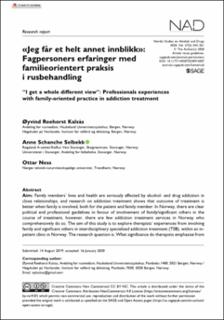«Jeg får et helt annet innblikk»: Fagpersoners erfaringer med familieorientert praksis i rusfeltet
Peer reviewed, Journal article
Published version
Permanent lenke
https://hdl.handle.net/11250/3045873Utgivelsesdato
2020-04Metadata
Vis full innførselSamlinger
Originalversjon
Kalsås ØR, Selbekk AS, Ness O. (2020) “I get a whole different view”: Professionals experiences with family-oriented practice in addiction treatment. Nordic Studies on Alcohol and Drugs; 37(3), 243-261. 10.1177/1455072520914207Sammendrag
Aim:
Family members’ lives and health are seriously affected by alcohol- and drug addiction in close relationships, and research on addiction treatment shows that outcome of treatment is better when family is involved, both for the patient and family member. In Norway, there are clear political and professional guidelines in favour of involvement of family/significant others in the course of treatment, however, there are few addiction treatment services in Norway who comprehensively do so. The aim of this study is to explore therapists’ experiences from involving family and significant others in interdisciplinary specialised addiction treatment (TSB), within an in-patient clinic in Norway. The research question is: What significance do therapists emphasise from involving family members within interdisciplinary specialised inpatient addiction treatment, and which professional and ethical challenges arise with such involvement?
Method:
The data was gathered through two focus-group interviews and analysed with thematic analysis.
Results:
The main findings of the analysis are: (1) “A solid treatment structure for family involvement is central to family-oriented work”, (2) “Substantial positive effects for both patient, family member and therapist are attributed to family-oriented treatment focus”, and (3) “New dilemmas and challenges arise as a consequence of emphasising family-oriented work”.
Conclusion:
The article gives insights in how treatment practice that involves family and network members can be organised, what can be achieved with such involvement, which challenges and dilemmas can arise, and discusses how these insights challenges language, ethics and judicial framework for addiction treatment.

